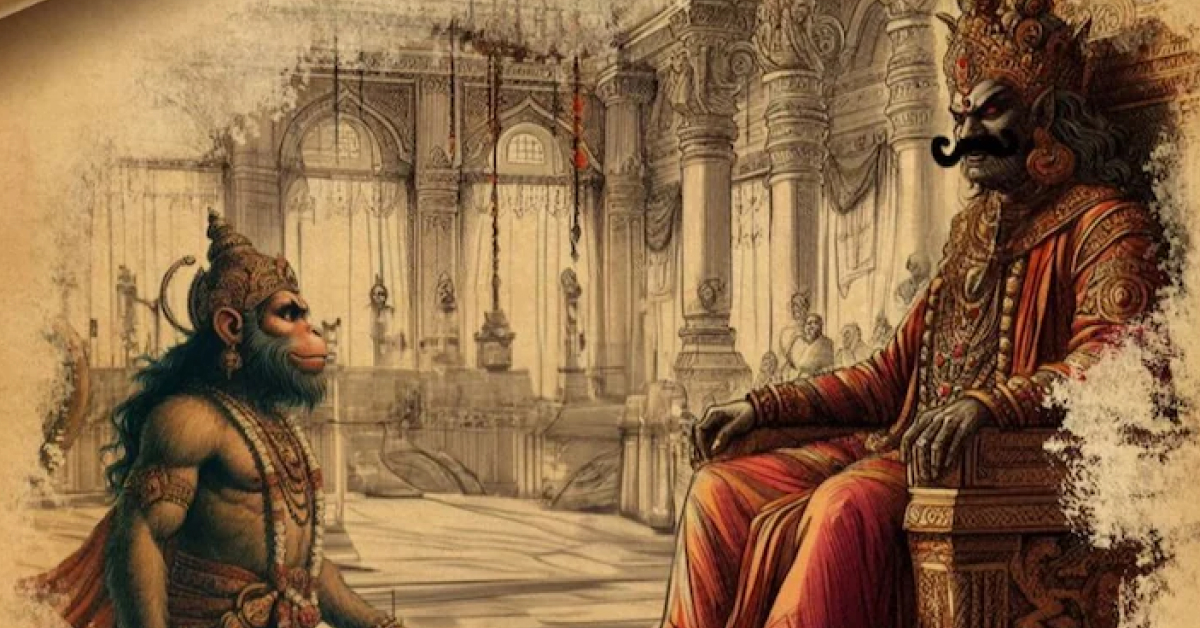A Messenger of Peace in the Face of Hostility
As tensions mounted between Rama’s forces and the mighty kingdom of Lanka, a final effort was made to prevent war. Rama, though justified in waging battle to rescue his wife Sita, sought to resolve the matter peacefully. He entrusted Angad with the critical mission of delivering a message of reconciliation to Ravana. This choice was both strategic and symbolic. Angad, a young warrior with the wisdom of experience, had personal stakes in the conflict. His father, Bali, had been wronged by Ravana, yet Angad rose above personal vendettas to act as an envoy of peace. Angad’s speech in Ravana’s court was a masterpiece of diplomacy. He spoke with clarity and conviction, urging Ravana to reflect on the path he had chosen. Angad emphasized the futility of war, not out of fear but out of wisdom. He appealed to Ravana’s sense of duty and dharma, urging him to return Sita to her rightful place and prevent the devastation that war would bring. His words were not just persuasive but deeply empathetic, recognizing Ravana’s strengths while pointing out the moral flaws in his decisions.
The Unyielding Grip of Ego
Despite the brilliance of Angad’s message, Ravana dismissed him with scorn. The king of Lanka, blinded by his ego and arrogance, refused to consider the possibility of compromise. Ravana’s refusal to engage in dialogue was not a failure of the message or the messenger but a reflection of his own insecurities and hubris.
Ravana’s pride led him to believe in his invincibility, and this overconfidence clouded his judgment. He dismissed Angad’s plea not as a warning but as an affront to his authority. This obstinance, driven by ego, marked the turning point where dialogue ceased to be an option, and the inevitability of war loomed large. Ravana’s inability to rise above his personal pride cost him dearly, leading to the eventual downfall of his kingdom, family, and legacy.
The Ripple Effect of Ignored Wisdom
The rejection of Angad’s plea set the stage for the catastrophic war between Rama’s forces and Ravana’s army. The war not only resulted in the death of Ravana and his kin but also decimated the city of Lanka, leaving it in ruins. The once-glorious kingdom was reduced to ashes, a stark reminder of the destructive power of ego and the price of refusing to engage in meaningful dialogue.
What makes this episode particularly poignant is the preventable nature of the destruction. Ravana had been given a choice—a chance to preserve his kingdom, his people, and his reputation. Yet his refusal to listen, his unwillingness to compromise, and his blind adherence to ego turned a resolvable conflict into a full-scale war.
This story highlights the broader consequences of failed conciliation, not just for the principal parties but for all those affected by their decisions. It serves as a reminder that conflicts, if left unresolved, can escalate into events that harm entire communities and generations.
A Modern Reflection on Ancient Wisdom
Though the Ramayana is an ancient text, its lessons remain profoundly relevant today. Modern conflicts, whether in personal relationships, businesses, or legal disputes, may not result in physical destruction but often cause significant emotional, financial, and interpersonal damage. The failure to resolve these disputes through dialogue can lead to long-term harm, with court battles and prolonged disagreements taking a toll on mental peace and financial stability.
Angad’s mission is a testament to the value of negotiation and empathy in conflict resolution. His ability to articulate the consequences of war and appeal to Ravana’s better judgment reflects the qualities that are essential for successful mediation. However, his failure to convince Ravana also underscores a critical truth: even the best intentions and efforts can falter when one party is unwilling to listen.
The True Essence of Conciliation
Conciliation is not just about the skill of the mediator but also about the willingness of the parties involved to engage in dialogue. Angad, as a messenger, fulfilled his role with unparalleled grace and wisdom. His failure was not due to a lack of effort or ability but to the unwillingness of Ravana to rise above his ego. This distinction is crucial in understanding the dynamics of failed conciliation.
In modern terms, mediators and conciliators often face similar challenges. Despite creating a space for dialogue and proposing fair solutions, they encounter parties who refuse to compromise or even consider alternatives. The Ramayana teaches us that while mediators are essential, the success of any resolution ultimately depends on the participants’ willingness to embrace change and humility.
A Path Forward Through ADR
The principles embodied by Angad’s mission are mirrored in today’s Alternative Dispute Resolution (ADR) practices. ADR platforms, like PrivateCourt, offer structured frameworks for resolving conflicts through dialogue and mutual understanding. By emphasizing communication and compromise, ADR helps avoid the prolonged litigation and emotional strain associated with unresolved disputes.
Just as Angad sought to prevent unnecessary destruction, ADR strives to minimize the collateral damage of modern conflicts. These platforms provide an environment where disputing parties can engage constructively, focusing on solutions rather than grievances.
The story of Angad’s failed conciliation in the Ramayana is a timeless reminder of the importance of dialogue and the dangers of ego-driven decisions. It teaches us that conflicts, no matter how complex, can be resolved through open-mindedness and a willingness to compromise.
In today’s world, embracing the principles of Alternative Dispute Resolution can help prevent the “modern wars” of legal battles and fractured relationships. By learning from history and fostering meaningful dialogue, we can resolve disputes constructively, preserving relationships, and building a foundation for lasting peace.

